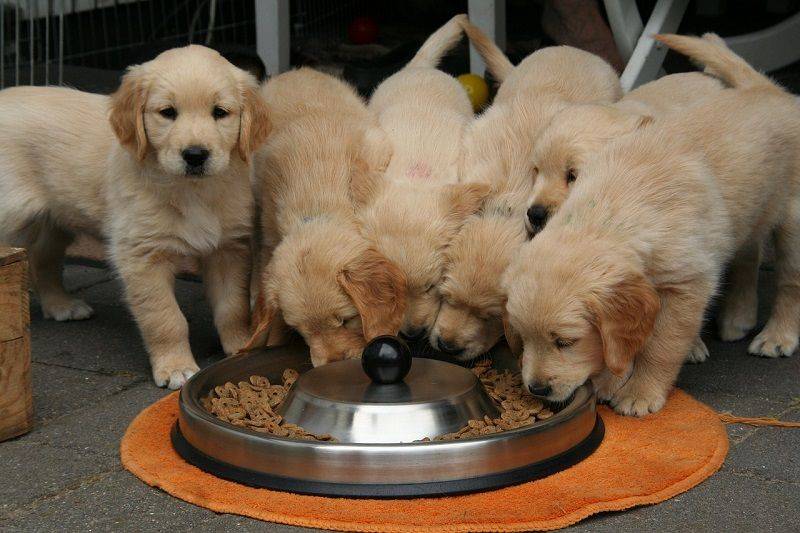With so many different brands and types of dog food on the market one of the first and most common questions asked by dog owners is “what should I feed my dog?”.
Unfortunately, there is often competing and conflicting information out there on the best diet for dogs and the ingredients your dog needs to thrive. Whether you prefer dry, raw or homecooked dog food this article outlines the key ingredients you should look for when finding healthy dog food for your best friend.

Meat
Meat is the primary source of protein in a dog’s diet and critically important to their overall health and well-being. Meat provides a wide range of vitamins and minerals and is one of the only sources of essential B vitamins and amino acids needed to keep your dog healthy and energetic.
Some great and widely available meats to feed your dog are:
- Beef
- Lamb
- Chicken
- Turkey
- Salmon
- Duck
- Alligator
- Venison
Where practical, mixing a few different animal proteins can be beneficial as your pooch gets a wider variety of nutrients. The organ meats of these animals are also extremely nutritious and very palatable to your dog although it is recommended that organ meat never makes up more than 10% of a dog’s diet.
A key factor when it comes to meat is the form of the meat that is in your dog’s food. Ideally, dogs are fed whole meat – i.e. meat that is in their original form before any processing. Whole meat tends to have a high moisture content however the digestibility of the protein is very high allowing for a greater absorption of the vitamins & minerals from the meat. Another form of meat that is commonly use in dog foods is ‘meat meal’. Meat meal is a form of ground-up meat that has been dried and cooked to remove the extra water content. Meat meal tends to have a lower moisture content however also has lower digestibility than whole meat. Meat meal is commonly found in dry dog foods and if you choose to feed your dog kibble, it’s important to pay attention to the type of meal that is being used. As a general rule, it is best to avoid dog food that contains meat meal which is generic in nature (does not specify animal source) or has the words ‘by-products’ in its name. For example, if the ingredients in a dog food contain phrases such as Meat Meal, Animal Meal or Meat and Bone Meal, these are best to avoid. The best type of meat meal ingredients are ones that specify the animal source – for example, chicken meal, beef meal, turkey meal, etc.
According to the Association of American Feed Control Officials (AAFCO) adult dogs require a minimum of 18% protein on a dry matter basis and these percentages will generally vary from 18-30% in most commercial pet foods.
Most dogs thrive on a meat-based diet so when it comes to finding the right food for your dog, a good rule of thumb is to try and pick a dog food where the meat comes from an identifiable source (either whole meat or animal-specific meat meal) and is also one of the main ingredients in your dog’s food.
Vegetables
Although not strictly necessary, vegetables are an important part of a dog’s diet providing a secondary source of energy and a range of different vitamins, minerals and antioxidants that keep your dog healthy and happy. Vegetables are also a great source of healthy fiber for dogs.
Some of the most nutritious vegetable to feed your dog are:
- Sweet Potato
- Pumpkin (Squash)
- Carrots
- Spinach
- Broccoli
- Parsley
- Green Beans
- Peas
With certain vegetables there can be too much of a good thing and the general rule of thumb is that any one vegetable should not make up more than 5-10% of your dog’s diet.
Fruits
Similar to vegetables, when fed in small amounts certain fruit can be very healthy for dogs providing a rich source of vitamins, fiber and antioxidants. They are also a great snack and treat options
Some healthy fruits to include in your dogs diet are:
- Apples (be sure to remove the core and all seeds)
- Blueberries
- Cranberries
- Watermelon (seedless)
- Bananas
- Cantaloupe
Fats & oils
While many human nutritionists view fat in a negative light, dogs require a balance of fatty acids that must be provided through diet. The right amount and balance of fats in your dog’s diet will assist proper cell function, digestion, provide energy and keep your dog’s skin and coat healthy and shiny. You should be looking for foods that contain high quality fats like Omega 3, 6 and 9. Good sources of omega fats include:
- Fish oils
- Canola Oil
- Safflower oil
- Olive Oil
- Seaweed, Spirulina or Kelp
- Chia Seeds
- Fats in animal meat
A balanced diet for a healthy adult dog requires about 10-15% fat. Not only will this amount help provide your dog with some of the energy that they need but this level of fat is also needed to ensure development & proper bodily function.
The right balance
Similar to human nutrition, the right balance of ingredients and nutrients is very important to your dog’s health. You should always look for a dog food that has “complete and balanced” on the label which means its formulated to meet the minimum standards of AAFCO nutritional guidelines.
If you have a puppy (up to 12 months old for small dogs and up to 18 months old for large dogs), be sure to choose a food that is appropriate to feed puppies and will give them all the nutrition they need for growth and development.
Lastly, if you do decide to switch up your dog’s diet, it is recommended that the transition to a new dog food is made slowly (over the course of 1 – 2 weeks) by gradually incorporating their new food into their existing food through substitution so that you can monitor for any potential issues.
While finding the right food to feed your dog can sometimes be daunting, ensuring these key ingredients are present in your dog’s diet will help make sure that they are receiving all the nutrients that they need to be healthy & happy!
